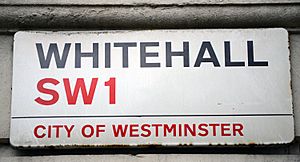Figure of speech facts for kids
A figure of speech is a special way of using words. It's when words or phrases are used in a way that isn't meant to be taken exactly as they sound. Instead, they create a special effect or meaning.

Whitehall is a street in London where many UK government offices are. People often say "Whitehall" to mean the government itself. This is an example of a figure of speech called Synecdoche.
Think of it like playing with words! Figures of speech help make language more interesting and powerful. They can make your writing or speaking more vivid and memorable.
For example, if someone says they "threw down the gauntlet", they don't mean they literally threw a glove on the ground. This phrase actually means they made a public challenge to someone.
Figures of speech can do two main things:
- They make language more colorful and interesting.
- They can help make ideas clearer or more impactful.
Common Types of Figures of Speech
Here are some common figures of speech you might hear or use:
- Allegory — This is like a long story or poem that has a hidden meaning. The characters or events in the story stand for something else, often a moral or political idea.
- Example: "The ship of state has sailed through rougher storms than the tempest of these lobbyists." This means the country (ship) has faced harder problems than the current issues caused by special interest groups (lobbyists).
- Antanaclasis — This is when you repeat a word, but each time it has a different meaning. It's a type of pun.
- Example: "If you don't see the light, you won't see the day." (The first "see" means understand, the second means live to.)
- Aphorism — A short, clever saying that expresses a general truth or opinion. It's like a proverb.
- Example: "Actions speak louder than words."
- Euphemism — Using a milder or nicer word or phrase instead of one that might be too harsh or unpleasant.
- Example: Saying someone "passed away" instead of "died."
- Hyperbole — Using extreme exaggeration to make a point or for emphasis. It's not meant to be taken literally.
- Example: "I'm so hungry I could eat a horse!"
- Innuendo — A hint, suggestion, or indirect remark, often about something negative or improper. The meaning is hidden but can still be understood.
- Example: "I'm not saying you cheated, but your answers were exactly the same as the person next to you."
- Irony — Saying the opposite of what you really mean, often to be funny or to make a point about a bad situation.
- Example: Describing a terrible day as "just perfect!"
- Metonymy — Referring to something by using the name of something closely related to it.
- Example: "The White House announced a new policy." (White House stands for the U.S. President or government.)
- Metaphor — Describing something by saying it is something else, even though it's not literally true. It compares two different things by saying one is the other.
- Example: "He has a heart of a lion." (Meaning he is very brave.)
- Paradox — A statement that seems to contradict itself but actually contains a deeper truth.
- Example: "Less is more."
- Proverb — A short, well-known saying that gives advice or expresses a common truth.
- Example: "When in Rome, do as the Romans do."
- Pun — A play on words that uses words with similar sounds but different meanings, or different meanings of the same word, often for humor.
- Example: "I've been to the dentist many times, so I know the drill."
- Rhetorical question — A question asked just for effect, not because you expect an answer. The answer is usually obvious.
- Example: "Are you serious?" (When someone does something silly.)
- Synecdoche — A figure of speech where a part of something is used to represent the whole, or the whole is used to represent a part. It's similar to metonymy.
- Example: "We need more hands on deck." (Hands means workers.)
- Example: "The law arrived quickly." (Law means police officers.)
- Truism — A statement that is obviously true and doesn't need to be proven.
- Example: "The sky is blue."

All content from Kiddle encyclopedia articles (including the article images and facts) can be freely used under Attribution-ShareAlike license, unless stated otherwise. Cite this article:
Figure of speech Facts for Kids. Kiddle Encyclopedia.
